Why Does The Torah Have So Many Mitzvot?
Why do we need so many commandments and laws? Isn’t it enough to be a good person?
By Ari Levisohn | 8 February 2024 | 7 Minute Read
Why Do We Need the Mitzvot?
Judaism has mitzvot (commandments). A lot of them. 613, in fact, and that’s not even including the rabbinic ones. Do you ever wonder why we need all of them? Why do we need commandments at all? Isn’t it enough for me to just be a good person, to follow my moral compass?! Isn’t that what God really cares about?
What if I told you that a Torah filled with laws wasn’t actually God’s “Plan A?” But God doesn’t make mistakes! That’s true, and yet, if we read the beginning of the Torah, God does appear to try out different models of how to run the world. Each time one fails, God tries out the next best option. Give me a minute to show you what I mean and then we’ll come back to our question about the mitzvot.
God’s Initial Plans For the World
Plan A: The Garden of Eden
In the beginning, humans lived together with God in the paradise of God’s own Garden of Eden. Wouldn’t it have been great if that never changed? But, unfortunately, we proved unfit for that level of responsibility when Adam and Eve ate from the Tree of knowledge, so God moved on to Plan B…
Plan B: The Pre-flood Word
Now, the difference between the pre and post-flood world is a bit complicated. We have a video all about it, but the gist is that before the flood we were guests in God’s world. Unfortunately, humanity proved horribly corrupt. God couldn’t tolerate us ruining his world, so he restarted the world with one key difference. After the flood, God turned over the keys to us, gave us permission to eat meat, etc. It is now our world. Whether we maintain it, or destroy it is our own problem.
Plan C: Utopian Universalism
Then came the tower of babel, representing the utopian vision of all nations speaking one language and working together. What a beautiful ideal! Except… with all of that unity came power and pride. The world belonged to humans, and, united, we could achieve anything. That would be a nice thing in theory, but that power and pride got to our heads. We strove to overcome God by building a tower. As a response, God mixed up all the languages and dispersed humans across the earth.
Plan D: Separate Nations
Perhaps, once divided up, each nation could build independent moral societies and worship God in their own way. But, yet again, this failed. Idolatry ran rampant in the generations following the Tower of Babel. So God moved on to the next best thing…
The Chosen People
God chose Abraham to found a special nation. God would have a special relationship with Abraham’s descendants and they would begin building a model society. The story of the second half of Genesis is all about choosing this nation. Which of Abraham’s descendants would be included in this nation, which wouldn’t? That’s the question our ancestors grappled with until Jacob’s twelve sons are solidified as the tribes of Israel at the end of Genesis.
Why Not Cut to the Chase?
You might be wondering, if God knows the future, and knew that Plan A, B, C, etc. were going to fail, why didn’t He cut to the chase and start the world with the chosen nation?
Probably, for our own sake, so we understand why the world looks like it does. We may dream of how nice it would be if we all still lived in Eden, or if all of humanity could hold hands and worship God together. God would have loved that too! But the story of Genesis is the story of why those options do not work. And why a chosen nation is really the best available option.
What About the Mitzvot?
So how does this help us understand why we have the mitzvot? Well, giving us a set of laws wasn’t God’s first plan either, even after deciding on a chosen nation. That’s why God never gave any of these commandments to Abraham or his children. He was hoping that Abraham and his descendants would follow their moral compasses and be good people. God even says this:
כִּי יְדַעְתִּיו לְמַעַן אֲשֶׁר יְצַוֶּה אֶת־בָּנָיו וְאֶת־בֵּיתוֹ אַחֲרָיו וְשָׁמְרוּ דֶּרֶךְ יְהוָה לַעֲשׂוֹת צְדָקָה וּמִשְׁפָּט
I have known [Abraham] that he will instruct his children and his household after him to keep the way of the Lord and carry out righteousness and justices.
(Genesis 18:19)
God knew that Abraham was a champion of justice and righteousness, without needing explicit instructions. God hoped that Abraham would found a nation of moral people who would follow in his ways.
So what happened to this ideal version of religion? It failed.
How a World without Mitzvot Failed
Now, there is some debate as to what extent the forefathers sinned, but certainly, by the time we get to the sale of Joseph, this latest experiment of God in creating his religion has failed. God trusted the forefathers to do the right thing, and by the fourth generation brothers are selling other brothers into slavery. Clearly, this was not going to work. It was time for yet another plan.
The Torah as a Guidebook
Enter the mitzvot. If we proved incapable of figuring out, on our own, what is right, then the solution was simple: give us a guidebook to teach us how to live a moral life. And that is how we arrived at the Torah we know and love, filled with commandments meant to guide us in living a moral and righteous life.
But, wait! If the Torah is a response to the failures of our forefathers, shouldn’t the laws in the Torah respond directly to those failures! The Torah is filled with obscure laws about things like returning lost oxen and refuge cities for accidental killers, or rituals like a 3 year tithe cycle. Those have nothing to do with the stories in Genesis, right?
The Real Meaning of the Mitzvot
Well… we at Aleph Beta believe that they do. We believe that the laws in the Torah respond directly to those very stories we know from Genesis. The Torah isn’t a book of random rules. It was given to real people with a real history, and it is in conversation with that history! The laws actually tell you how to read those stories and how to incorporate the lessons we learn from them into our lives.
That’s a pretty bold claim, I know! If the laws of the Torah are really derived from specific stories, how can we study these laws—how can we live these laws—without studying the stories they are derived from?! We would be missing the boat, wouldn’t we?
Well, at Aleph Beta, we think so too. That’s why we have built a library of videos that strive to unpack the Torah in exactly this way. Wondering where to start? Here are a few great videos that unpack exactly how the Torah’s laws are based on its stories, and how we are really meant to relate to them.
More Videos
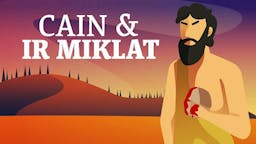
How the Story of Cain and Abel Becomes Part of Our Laws
Video • 13 min
The story of Cain and Abel turns out to provide the context for the laws of the Cities of Refuge, the safe havens for one who kills accidentally. In this video, originally made for Parshat Shoftim, Rabbi Fohrman gives us a context to understand what lies beyond accidental murder, and how to become more sensitive individuals.
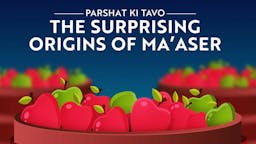
Where Does Tithing Come From In The Bible?
Video series • Part 1 of 2 • 14 min
Ki Tavo describes for us the law of ma’aser, tithing, and the law of vidui ma’aser, the declaration of ma’aser. But why isn’t it enough to give ma’aser? Why the spectacle of the dramatic statement?
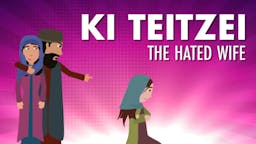
Ki Teitzei: The Hated Wife
Video series • Part 1 of 2 • 11 min
In this video, we discuss the Torah's laws about a man with two wives, one who he loves, and one who he hates. Rabbi Fohrman suggests that this legal section of text is a hint to the story of Jacob and his wives. Watch the next video to learn more!
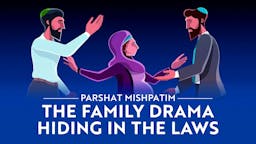
How Can The Laws Of Mishpatim Help Correct Past Mistakes?
Video series • Part 1 of 2 • 14 min
At first glance, Mishpatim reads like a dry list of laws about cows, and donkeys, property damages and personal injuries. But what if there's more to these laws lurking beneath the surface? What if the laws themselves hold a key to understanding some of the most important stories in the Torah? Join Ami as he uncovers the hidden story within these laws.
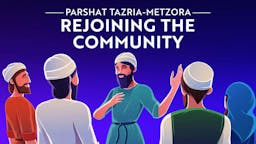
What Does The Passover Sacrifice Teach Us About The Metzora?
Video • 12 min
In this video, Rabbi Fohrman picks up from last year's Tazria and Metzora videos, which connected the metzora purification process with the korban pesach. Here, he argues that only through the two processes can we become fully alive and part of the community.
More Guides
Yitro: The Template For The Ten Commandments
Printable Guide
A printable parsha guide for our Yitro video, "The Template For The Ten Commandments"
Re'eh: Why Does Judaism Need The Written Law And Oral Law?
Printable Guide
A printable parsha guide for our Re'eh video, "Why Does Judaism Need The Written Law And Oral Law?"
What is Aleph Beta?
Aleph Beta is a unique kind of Torah library. Led by our founder, Rabbi David Fohrman, we are dedicated to high-level, textual Torah learning for adults that is intellectually and spiritually sophisticated, that enlivens your Jewish practice and helps you forge a deeper connection to God. Whether you’ve been learning in yeshiva for years or you’re just beginning your Torah journey, you’re sure to find something meaningful and surprising waiting for you here.
Browse our library of over 1,000 beautifully produced animated videos, podcasts, deep dive courses, and printable guides. Topics include the weekly parsha, Jewish holidays & fast days, laws & mitzvot, prayers, relationships, big philosophical ideas and more. Have something to say at the Shabbos table that will amaze your family and guests and bring deep meaning into their lives.


